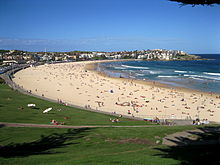Australophile
This article needs additional citations for verification. (May 2018) |

An Australophile is one who appreciates or expresses love of Australian culture, the Australian people, Australian history or all things Australian in general.[1] An Australophile may extend to someone who is born outside Australia and the definition is not limited to an Australian itself. The concept of Australophilia or Ozophilia[2] is opposed to Australophobia, which is the dislike or fear of Australia and its cultural aspects.
The phenomenon was notable in the United States in the 1980s, as many films released at the time took place in Australia or featured Australian characters.
Australia is also a popular choice for students attending universities who are doing study abroad programs.
Description
In some cases, the term Australophile represents an individual's appreciation of Australian history and traditional Australian culture (e.g. Ned Kelly, Steve Irwin, Don Bradman, Phar Lap) Australophile may also be characterized by fondness for the Outback, Uluru, beaches of Australia and Great Barrier Reef or institutions (e.g. Australian and New Zealand Army Corps, Surf Life Saving Australia, Royal Flying Doctor Service of Australia), and the old Australian class system. Australophile may enjoy Australian actors, films, TV shows, radio shows, comedy, musicians, books, magazines, fashion designers, Architecture cars, traditions (e.g. Sausage sizzle) or subcultures.
Australian artists such as Olivia Newton-John, Kylie Minogue, Keith Urban, and Iggy Azalea have found success abroad throughout the history of popular culture.
Australia has been the setting for many films. Film franchises such as Mad Max and Crocodile Dundee have been credited as leading to a sparked interest in the country.[citation needed]
See also
External links
- ^ "Words of Love". Archived from the original on 19 June 2017. Retrieved 3 June 2011.
- ^ "Why the Conservative Party adores Australia". The Economist. ISSN 0013-0613. Retrieved 18 June 2020.
